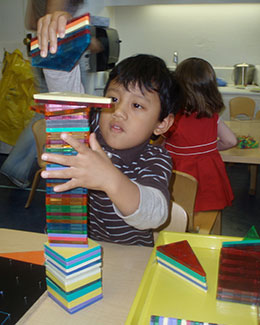
In a world in which two-year-olds are computer adept, we give them blocks.
In a world in which four-year-olds can use a microwave to prepare food, we make applesauce with them.
In a world in which some preschoolers are being prepared for test taking, we have no ditto sheets, workbooks, or computer learning programs.
What does this mean for your child?
The long answer to this question involves a lot of thought, observation and discussion.
The shorter answer is this: ECC remains true to the progressive education model, a model that is based on the centrality of direct experience in learning; the view of the child as the center of the educational experience; and the making of meaning and construction of knowledge through experience and reflection, as both the goal and the means of education.
Educational fads and opinions come and go; educational innovations and mandates come and go; educational policy changes with political and historical and economic realities. But the goals and methods of experientially based, developmentally appropriate education have not changed.
This means that the ECC, like the College of which it is part, holds true to its beliefs, even as each teacher finds his or her own way to put them into practice – and as all teachers seek new ways of bringing those beliefs to bear on each individual child in the community of the classroom and the school.
Jan Drucker
Consultant to the Early Childhood Center
Psychology faculty member
"Our first two years at the ECC have been nothing less than magical. The small and welcoming environment make every family feel right at home. Our daughter started in the Two's program, which is the softest transition into a school setting that one could hope for. It was engaging, loving, and fun. She quickly adjusted to her new surroundings and easily transitioned into her second year there. During her second year she blossomed into a social, confident child. She enjoys play at every level. Indoors and outdoors, singing, painting, or just playing with cars. Teachers are there to watch, guide, and facilitate. They do not direct or force a child to do anything they are not interested in. Their main goal is to allow each child to be comfortable doing what interests them most in whatever setting that may be. It has been an incredible learning experience as a parent as well. Every day that I pick my child up from school I am reminded how I can be a better parent that day and going forward. I wouldn't trade this experience for the world!" —ECC Parent